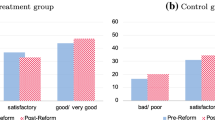Abstract
This study examines whether individuals’ self-assessed health is related to their previous standing in the labor market and their self-assessed health at that time. We find that, once self-assessed health in the past is controlled for, none of the specified reasons behind individuals’ labor market status at that time, including the inability to find work, have a statistically significant adverse impact on current assessment of physical or mental health. We do find, however, that women obtaining a job in the past period will currently perceive that their physical health is improved, and that previously unemployed men with a job to return to in the current period also experienced perceptions of better health in the current period. We present evidence that these perceptions share a common factor with other health indicators such as sick days and quasi-objective measures of physical and mental health.
Similar content being viewed by others
Notes
This result runs counter to the findings of Theodossiou (1998).
Details on the location of these measures in MEPS are in Part A of the Statistical Appendix (Jefferson and Pryor 2013).
Our measure of mental health differs from that of Theodossiou (1998) who measured psychological well-being and found that unemployment led to “greater strain,” “less enjoyment of day-to-day activities,” “being less able to face up to problems”, “less confidence,” “more thinking of being a worthless person,” and “feeling less happy.” He used the British Household Panel Study for his regression with a sample of roughly 7900 individuals in 1992.
Details on the location of the labor market status measures in MEPS are discussed in Part A of the Statistical Appendix (Jefferson and Pryor 2013).
In the MEPS, the education variable is defined as number of years of education when first entered MEPS. This variable does not change over time. The region variable is defined as region of residency at the end of the year. There is essentially no time variation in this variable.
References
Agency for Healthcare Research and Quality. (2008). Medical Expenditures Panel Survey Household Component (MEPS HC - 106), 2006 Full Year, Consolidated Data File, Panel 10, (www.meps.ahrq.gov/mepsweb).
Arellano, M., & Bond, S. (1991). Some tests of specification for panel data: Monte Carlo evidence and an application to employment equations. Review of Economic Studies, 58, 277–297.
Arellano, M., & Bover, O. (1995). Another look at the instrumental variable estimation of error-components models. Journal of Econometrics, 68(1), 29–51.
Berkman, L., & Kawachi, I. (Eds.). (2000). Social Epidemiology. New York: Oxford University Press.
Blundell, R., & Bond, S. (1998). Initial conditions and moment restrictions in dynamic panel data models. Journal of Econometrics, 87(1), 115–143.
Bose, L., & Bohle, P. (2002). Health and social effects of downsizing: A review. The Economic and Labor Relations Review, 13(2), 270–287.
Clark, A. E. (2003). Unemployment as a Social Norm: Psychological Evidence from Panel Data. Journal of Labor Economics, 21(2), 323–351.
Clark, A. E., et al. (2001). Scarring: The psychological impact of past unemployment. Economica, 68, 221–241.
Currie, J., & Madrian, B. (1999). Health, health insurance and the labor market. In O. Ashenfelter & D. Card (Eds.), Handbook of labor economics (Vol. 3C, pp. 3309–3416). New York: Elsevier.
Greenberg, E., et al. (2010). Turbulence: Boeing and the State of American workers and managers. New Haven: Yale University Press.
Halliday, T. (2008). Heterogeneity, state dependence, and health. Econometrics Journal, 11, 499–516.
Jefferson, P., & Pryor F. (2013). “Statistical Appendix: Labor/Health,” at http://www.swarthmore.edu/academics/economics/faculty-and-staff/philip-jefferson.xml.
Linn, M., et al. (1985). Effects of unemployment on mental and physical health. American Journal of Public Health, 75(5), 502–506.
McGarry, K. (2004). Health and retirement: do changes in health affect retirement expectations? Journal of Human Resources, 39(3), 624–648.
Miller, D., et al. (2009). Why are recessions good for your health? American Economic Review: Papers and Proceedings, 99(2), 122–127.
Rabin, M., & Schrag, J. (1999). First impressions matter: a model of confirmatory bias. The Quarterly Journal of Economics, 114(1), 37–82.
Ruhm, C. J. (2000). Are recessions good for your health? Quarterly Journal of Economics, 115(2), 617–650.
Strully, K. (2009). Job loss and health in the U.S. labor market. Demography, 48(2), 221–246.
Sullivan, D., & von Wachter, T. (2009). Job displacement and mortality: an analysis using administrative data. The Quarterly Journal of Economics, 124(3), 1265–1306.
Theodossiou, I. (1998). The effects of low-pay and unemployment on psychological well-being: a logistic regression approach. Journal of Health Economics, 17(1), 85–104.
van der Horst, F. G. E. M. et al. (1992). “Causality in the Relation between Health and Long-term Unemployment,” In C. H. A. Verhaar and Lammert Gosse Jansman, (eds), On the Mysteries of Unemployment, (pp. 225–53). Boston: Kluwer.
Acknowledgments
We thank Kathleen McCann of Social and Scientific Systems for assistance with our data; Adrian Lucas and members of the Swarthmore-Byrn Mawr-Haverford Summer Seminar for helpful comments; and Victoria Wilson-Schwartz for editorial assistance. Jefferson’s research is supported by a Swarthmore College Faculty Research Grant.
Author information
Authors and Affiliations
Corresponding author
Rights and permissions
About this article
Cite this article
Jefferson, P.N., Pryor, F.L. Does Labor Market Status Influence Self-Assessed Health?. Int Adv Econ Res 20, 45–56 (2014). https://doi.org/10.1007/s11294-013-9451-y
Published:
Issue Date:
DOI: https://doi.org/10.1007/s11294-013-9451-y




